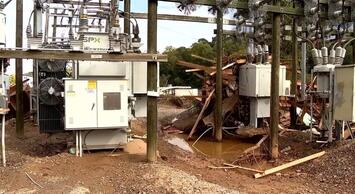
The reports about the damage caused by Hurricane Helene and the amount of water dumped on the region by the storm are gobsmacking. Last week, my friend, Jimmy Fortuna, an energy industry executive who lives in Asheville, sent me a text. He said, “Brother, I’m telling you, it’s like God’s own bulldozer went down these mountains and valleys. Maybe it did. Whole sections of town in Asheville and some whole towns in the mountains around us turned into mud flats.”
At least 230 people are confirmed dead from the storm. Major roadways were destroyed and it’s unclear when they will be rebuilt. Last week, a press release from Congressman Chuck Edwards, said some 360 electric substations were “damaged or destroyed” by Helene. And now Duke Energy is warning that about 1 million of its customers should prepare for extended outages due to Hurricane Milton. That Category 5 storm is expected to make landfall on Wednesday near Tampa, Florida.
Hurricanes Helene and Milton are shaping up to be two perfect storms that will throw more fuel on the inflation storm that’s slamming the US electric grid. At the exact moment US utilities are facing EPA mandates to decarbonize their generation mix and the Biden Administration is pushing for massive expansions of high-voltage transmission and alt-energy capacity, the prices for all types of utility kit — from breakers and transformers to hardware and gas turbines — are soaring.
These hurricanes will put additional pressure on utility supply chains that are already struggling to keep up with demand. Add in shortages of skilled labor, and the result is that prices for critical components — and even whole power plants — have jumped by as much as 75% in less than two years. And those soaring prices will, of course, ultimately be paid by consumers.
Over the past few months, I’ve interviewed several dozen people who work in the power sector about the supply chain and labor challenges they face. The best summary I got was from an engineer who works at a leading engineering, procurement, and construction firm. He told me “If we had the parts, we don’t have enough people. And if we had enough people, we don’t have the parts.” Indeed, an inflationary hurricane is shorting the grid. (A hat tip here to my pal, Meredith Angwin, and her marvelous book, Shorting The Grid.)
Read the rest of this piece at Robert Bryce Substack.
Robert Bryce is a Texas-based author, journalist, film producer, and podcaster. His articles have appeared in a myriad of publications including the Wall Street Journal, New York Times, Forbes, Time, Austin Chronicle, and Sydney Morning Herald.
Photo: The electric substation in Asheville was damaged by Hurricane Helene. Source: WLOS.com












